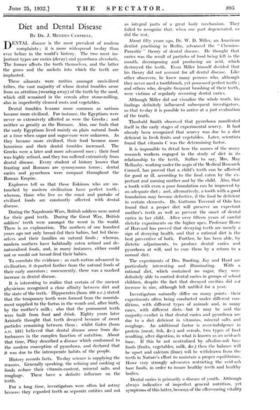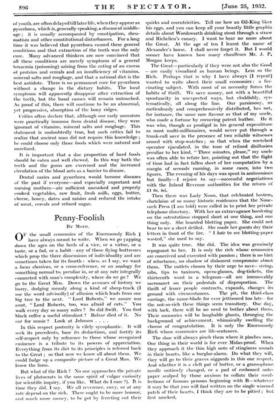Diet and Dental Disease
BY DR. J. MENZIES CAMPBELL. DENTAL disease is the most prevalent of modern complaints ; it is more widespread to-day than ever before in the world's history. The two most im- portant types are caries (decay) and pyorrhoea alveolaris. The former affects the teeth themselves, and the latter the gums and the sockets into which the teeth are implanted.
These ailments were rarities amongst uncivilized tribes, the vast majority of whose dental troubles arose from an attrition (wearing away) of the teeth by the sand, which still 'remained in the cereals after stone-milling, also in imperfectly cleaned roots and vegetables.
Dental troubles bname more common as nations became more civilized. For instance, the Egyptians were never so extensively affected as were the Greeks ; and neither so greatly as the Romans. Also, one finds that the early Egyptians lived mainly on plain natural foods at a time when sugar and sugar-cane were unknown. As they became more civilized, their food became more luxurious. and their dental troubles increased. The Greeks were a later and more advanced race ; their food was highly refined, and they too suffered extensively from dental disease. Every student of history knows that feasting and Romans are synonymous terms ; dental caries and pyorrhoea were rampant throughout the Roman Empire.
Explorers tell us that those Eskimos who are un- touched by modern civilization have perfect teeth ; whereas, those who live on the coast and partake of civilized foods are constantly affected with dental disease.
During the Napoleonic Wars, British soldiers were noted for their good teeth. During the Great War, British soldiers' teeth were amongst the worst in the world. There is an explanation. The mothers of one hundred years ago not only breast-fed their babies, but fed them- selves and their families on natural foods ; whereas, modern mothers have habitually eaten refined and de- naturalized foods, and, in many instances, either could not or would not breast-feed their babies.
To correlate the evidence : as each nation advanced in civilization, it departed farther from the natural foods of their early ancestors ; concurrently, there was a marked increase in dental disease.
It is interesting to realize that certain of the ancient physicians recognized a close affinity between diet and the state of the teeth. • Hippocrates (born 460 u.e.) stated that the temporary teeth were formed from the nourish- ment supplied to the foetus in the womb and, after birth, by the mother's milk ; also that the permanent teeth were built from food and drink. Eighty years later Aristotle thought that teeth decayed because of sweet particles remaining between them ; whilst Galen (born A.D. 131) believed that dental disease arose from disz turbances in the complex function of nutrition. About that time, Pliny described a disease which conformed to the modern conception of pyorrhoea, and declared that it was due to the intemperate habits of the people.
History records facts. To-day science is supplying the reasons. Generally speaking, the refining and cooking of foods reduce their vitamin-content, mineral salts and roughage. These have a definite influence on the teeth. • For a longtime, investigators were often led astray because they regarded teeth as separate entities and not as integral parts of a great body mechanism. They failed to recognize that, when one part degenerated, so did the rest.
About fifty years ago, Dr. W. D. Miller, an American dentist practising in Berlin, advanced the " Chemico- Parasitic " theory of dental disease. He thought that caries was the result of particles of food being left in the mouth, decomposing and producing an acid, which destroyed the teeth. Even Miller himself decided that his theory did not account for all dental disease. Like other observers, he knew many persons who, although they never used a toothbrush, yet possessed perfect teeth ; and others who, despite frequent brushing of their teeth, were Victims of regularly recurring dental caries.
Although Miller did not visualize the whole truth, his findings definitely influenced subsequent investigators, so that to-day it is possible to arrive at a just evaluation. of the truth.
Theobald Smith observed that pyorrhoea manifested itself in the early stages of experimental scurvy. It had already been recognized that scurvy was due to a diet deficient in fresh fruits and vegetables. Later, scientists found that vitamin C was the determining factor.
It is impossible to detail here the names of the many research workers engaged in the study of diet in its relationship to the teeth. Suffice to say, Mrs. May Mellanby, working under the aegis of the Medical Research Council, has proved that a child's teeth can be affected for good or ill, according to the food eaten by the ex- pectant and nursing mother and by the child. Also, that a tooth with even a poor foundation can be improved by an adequate diet ; and, alternatively, a tooth with a good foundation may become defective, if the food be deficient in certain elements. Dr. Guttorm Toverud of Oslo has found that a proper diet will preserve an expectant mother's teeth as well as prevent the onset of dental caries in her child. After over fifteen years of careful dietetic experiments on the higher apes, Professor Howe of Harvard has proved that decaying teeth are merely a sign of decaying health, and that a rational diet is the best preventive of both. Further. he has been able, by dietetic adjustments, to produce dental caries and pyorrhoea at will, and to cure them by a return to a normal diet.
The experiments of as. Bunting, Jay and Hard are particularly interesting and illuminating. With Ir- rational diet, which contained no sugar, they were definitely able to control dental caries in groups of school children, despite the fact that decayed cavities did nrd increase in size, although left unfilled for a year.
Investigators naturally differ on many points —their experiments often being conducted under different C011- ditions, with different types of animals and, in many cases, with different diets—but it may be said the majority-verdict is that dental caries and pyorrhoea are due to a diet deficient in vitamins, mineral salts and roughage. An additional factor is over-indulgence in protein (meat, fish, &e.) and cereals, two types of food resulting, after digestion, in what is known as an acid-ash base. If this be not neutralized by alkaline-ash base foods (fruits, vegetables, milk, &c.) then the balance will be upset and calcium (lime) will be withdrawn from the teeth in Nature's effort to maintain a proper equilibrium. Howe very strongly advocates restricting the acid-ash base foods, in order to insure healthy teeth and healthy bodies.
Dental caries is primarily a disease of youth. Although always indicative of imperfect general nutrition, yet symptoms of this latter, because of the effervescing vitality of youth, are often delayed till later life, when they appear as pyorrhoea, which is, generally speaking, alliscaseof middle- age ; it is usually accompanied by constipation, rheu- matism and other constitutional disturbances. For a long time it was believed that pyorrhoea caused these general conditions and thatextraction of the teeth was the only cure. Many advanced thinkers arc now convinced that all these conditions are merely symptoms of a general toxaemia (poisoning) arising from the eating of an excess of proteins and cereals and an insufficiency of vitamins, mineral salts and roughage, and that a rational diet is the best antidote. There is no permanent cure for pyorrhoea without a change in the dietary habits. The local symptoms will apparently disappear after extraction of the teeth, but the basal causes will remain untouched. As proof of this, there will continue to he an abnormal, yet progressive, absorption of the bony ridges.
Critics often declare that, although our early ancestors were practically -immune from dental disease; they were ignorant .of vitamins, mineral salts and roughage. This statement is undoubtedly true, but such critics fail to realize that ancient man did not require this knowledge ; he could choose only those foods which were natural and unrefined.
It is important that a due proportion of hard foods should be eaten and well chewed. In this way both the teeth and the gums are exercised and the increased circulation of the blood acts as a barrier to disease.
Dental caries and pyorrhoea would become diseases of the past if everyone—and especially expectant and nursing mothers—ate sufficient uncooked and properly cooked vegetables, raw fruit, fresh milk, eggs, butter, cheese, honey, dates and raisins and reduced the intake of meat, cereals and refined sugar.



































 Previous page
Previous page